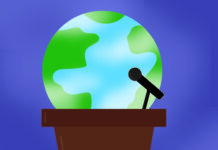Today, an increasing number of young people are abstaining from raising children, pointing to reasons such as the ongoing climate crisis, overpopulation, personal aspirations, financial and health concerns, and a simple disinterest in child rearing.
As an educator working for a daycare centre for preschool-aged children, I continue to notice the negative cultural shifts in attitudes towards children. Whenever a child does something deemed ‘inconvenient’ in public — like yelling or crying — there is a noticeable amount of annoyance, disgust, and vitriol held against the parent or the child themselves. I’ve noticed a lot of childfree people, in their explanations for abstaining from child-rearing, making statements such as “I hate kids” — equally as concerning as the casual tone of the statement itself is the level of acceptance and agreement it is met with.
It is becoming more and more acceptable to treat kids as a burden on society — as if life would be more peaceful if children were locked indoors until they were older. It does not matter if one is ‘decent’ enough to refrain from saying or doing anything rude towards the parent or child when they feel inconvenienced (truthfully, that is the bare minimum) — the hatred towards children remains, living comfortably in silence.
This needs to change. If we truly care about tackling systems of oppression, and helping youth and adults live long and healthy lives, it is in our best interest to change the way we treat children. We need to allow children to be fully immersed in their childhoods, without being beaten down by the expectation to grow up and express wisdom beyond their years, and without discrimination or neglect. It is nonsensical to expect the future generation to grow up to become healthy and confident adults if they enter a world that is hostile to them not only on a grand scale — all social, economic, environmental, and political issues considered — but on a cultural, interpersonal level as well; a world where children and youth are patronized, belittled, and ignored.
Many of the arguments against children can be compared to ableism — a three-year-old might not be able to speak articulately, regulate their emotions in public, read or write, understand social cues, or complete most tasks without assistance, but there are millions of adults alive today who cannot do these things either due to a wide variety of different disabilities and illnesses. Ableism is also a widespread issue that has become especially apparent over the course of the pandemic.More broadly, discriminating against anyone based on their social locations (e.g., race, ethnicity, sexual orientation, gender identity and expression, nationality, religion, ability, socioeconomic class) is unacceptable — these are things that one cannot control, and there are entire systems of oppression built on top of social locations that function to keep minority groups from existing peacefully. Yet many of the socially conscious young people I associate with cease to recognize how children fit into this picture; how the cynicism and hatred towards children is discrimination.
Children cannot control the fact that they are children, the same way that you cannot control the year you were born and the age you are now. They cannot control their physical, social, emotional, and neurological development. Rather, their development largely depends on factors in their environment, such as how they are treated and taught by the people in their lives. If they are spoken to with patience, love, understanding, fairness and encouragement, they will develop into healthy and self-assured adolescents who know that they are supported in their lives. Conversely, if they are spoken to with bitterness, contempt, impatience and ignorance, their path to healthy development will be blocked by shame, insecurity and health issues later in life. This extends beyond immediate family — the way that we, as a society, speak to children matters.
Even as children, they are complete human beings. While a three-year-old might only be three-years-old, and their bodies and brains are rapidly changing, they still possess a rich inner world similar to yours. It is unfair to expect a three-year-old to regulate their emotions the same way a thirty-year-old might be able to. They are not lesser because of their age or lack of life experience. If you have ever felt like you were forced to grow up too fast, you know how painful that experience is, and yet we — on a large scale — expect children to rush through their childhoods and become taxpaying adults as quickly and ‘conveniently’ as possible. Childhood should not be a stepping stone to adulthood. Childhood is childhood — it is its own rich experience that spans some ten or twenty years of one’s life.































